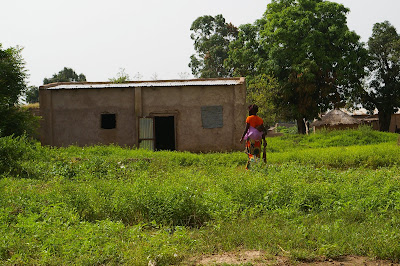 I can’t believe I’m leaving today. After waiting for this day for so long, it’s really bizarre that it’s finally here. I have really mixed feelings about it—I’m happy to be seeing people again, eating good food again, and just having some sort of normalcy again, but at the same time I’m really sad to leave my host family and it’s absolutely crazy to think that I’ll probably never be in Mali again. It really has been an amazing experience. I’ve learned so much from just living here, especially because it’s a culture so incredibly different from my own. It’s funny that what made it so hard is also what made it so valuable.
I can’t believe I’m leaving today. After waiting for this day for so long, it’s really bizarre that it’s finally here. I have really mixed feelings about it—I’m happy to be seeing people again, eating good food again, and just having some sort of normalcy again, but at the same time I’m really sad to leave my host family and it’s absolutely crazy to think that I’ll probably never be in Mali again. It really has been an amazing experience. I’ve learned so much from just living here, especially because it’s a culture so incredibly different from my own. It’s funny that what made it so hard is also what made it so valuable.Some final reflections in the form of top ten lists.
Top 10 Things I Won’t Miss About Mali
Honorable Mention: Bad Skype connections
10) Sweating under a mosquito net at night
9) Air and ground pollution
I am waiting to get off the airplane in France and take a deep breath. It’s going to be awesome.
8) Bathroom that doubles as a mosquito hatchery
Mosquitoes are never fun. When you’re trying to bathe, though, it becomes a little more of a concern because there are just some places that you really don’t want to get bitten. Also, somewhat related, I am really looking forward to warm showers. Cold water wasn’t too bad until the temperature dropped slightly in December. Now it’s just kind of painful.
7) Risk of illness
I am so happy that I never really got sick. With 18 students in my group, there were 11 cases of malaria, three cases of typhoid, three stomach infections and a whole other slew of the things that went undiagnosed, not to mention Jen, who got hit by a bus (don’t worry, she’s ok) on the first day. Needless to say, I was pretty lucky. Also, not having to sanitize water all the time is going to great.
6) My host-brother Tonton
While it’s not his fault that he’s a product of absolutely no discipline and huge amounts of spoiling, an 8 year-old that throws tantrums on a daily basis is somewhat annoying.
5) Most men ages 15-45
Some quotes:
“You please me a lot.”
“I fell in love with you the moment I saw you.”
“You are more beautiful than the dawn.”
“You’re the first white woman I’ve ever spoken to like this.”
4) Being a "Tubabu"
Most of the time it didn’t bother me too much, but I’m not going to miss being chanted at as I walk down the street or being grabbed by people who want to touch me/talk to me/show me something they’re selling. It is going to be weird being around so many whiteys, though.
3) Food (except fruit, plantains, frou frou, and bouillie)
2) 4-8 hours of alone time per day
1) Inaccessibility of everyone and everything
Top 10 Things I Will Miss About Mali
10) Malian soda
I swear the Cokes here just taste better. I think they actually do use another kind of sugar, or it could just be something about something cold in 100° heat. Also, D’Jino Pamplemousse (Grapefuite soda) and Fanta Cocktail (just sickenly sweet, unidentifiable fruit-flavored soda) are awesome.
9) Selected TV Shows
I think I mentioned my addiction to Brazilian telenovellas dubbed into French before, but I’m really going to miss Marina and Les Deux Visages d’Ana. I’m also going to miss Trace, the French/Caribbean music video TV channel. So bad, they’re good.
8) Fruit, plantains, frou frou, and bouillie
7) Slower pace of life
I’m pretty nervous about returning to the U.S. and having such a full schedule. I’ve gotten pretty use to having nothing to do all the time, so I’m pretty sure that my fast-paced, over-committed life in the States is going to be a shocker. Actually having time to read was also really nice. I actually read four different books just this past month, which you probably know is something of a record since I’m really not a big reader. It was kind of nice.
6) Speaking French
5) Cheap public transportation
4) Speaking Bambara
Although I definitely didn’t master the language, it was still really fun to talk to Malians in Bambara. I’m really going to miss it, especially the greetings.
3) My host sisters Jolie and Aïda and Jen’s host family
2) Being called Safi and Safiatou
Even my American friends here called me Safi, so it’s really sad to say goodbye to my Malian name.
1) Bean jokes being hilarious
This is sort of indescribable, but probably the best way to explain the amazingness of bean jokes is that it’s sort of like the whole country has the same, huge inside joke. As soon as I found out someone’s last name is Diarra or Coulibaly, I have free reign to call him a bean eater, and he usually argues back that I am his slave or an even bigger bean eater. It really is hilarious. I swear.
So, with that, I say goodbye to Mali. It’s been unforgettable an experience.
K’an bεn Mali! Tu vas me manquer!





















